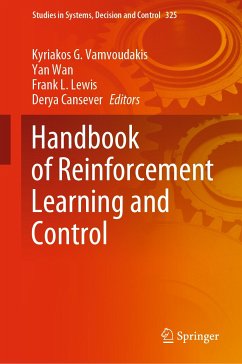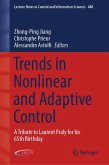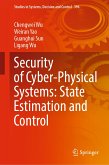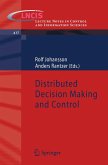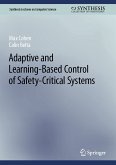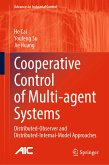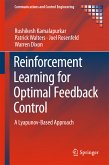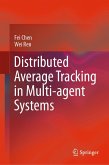Handbook of Reinforcement Learning and Control (eBook, PDF)
Redaktion: Vamvoudakis, Kyriakos G.; Cansever, Derya; Lewis, Frank L.; Wan, Yan


Alle Infos zum eBook verschenken

Handbook of Reinforcement Learning and Control (eBook, PDF)
Redaktion: Vamvoudakis, Kyriakos G.; Cansever, Derya; Lewis, Frank L.; Wan, Yan
- Format: PDF
- Merkliste
- Auf die Merkliste
- Bewerten Bewerten
- Teilen
- Produkt teilen
- Produkterinnerung
- Produkterinnerung

Hier können Sie sich einloggen

Bitte loggen Sie sich zunächst in Ihr Kundenkonto ein oder registrieren Sie sich bei bücher.de, um das eBook-Abo tolino select nutzen zu können.
This handbook presents state-of-the-art research in reinforcement learning, focusing on its applications in the control and game theory of dynamic systems and future directions for related research and technology.
The contributions gathered in this book deal with challenges faced when using learning and adaptation methods to solve academic and industrial problems, such as optimization in dynamic environments with single and multiple agents, convergence and performance analysis, and online implementation. They explore means by which these difficulties can be solved, and cover a wide range of…mehr
- Geräte: PC
- ohne Kopierschutz
- eBook Hilfe
- Größe: 20.4MB
![Trends in Nonlinear and Adaptive Control (eBook, PDF) Trends in Nonlinear and Adaptive Control (eBook, PDF)]() Trends in Nonlinear and Adaptive Control (eBook, PDF)129,95 €
Trends in Nonlinear and Adaptive Control (eBook, PDF)129,95 €![Security of Cyber-Physical Systems: State Estimation and Control (eBook, PDF) Security of Cyber-Physical Systems: State Estimation and Control (eBook, PDF)]() Chengwei WuSecurity of Cyber-Physical Systems: State Estimation and Control (eBook, PDF)113,95 €
Chengwei WuSecurity of Cyber-Physical Systems: State Estimation and Control (eBook, PDF)113,95 €![Distributed Decision Making and Control (eBook, PDF) Distributed Decision Making and Control (eBook, PDF)]() Distributed Decision Making and Control (eBook, PDF)73,95 €
Distributed Decision Making and Control (eBook, PDF)73,95 €![Adaptive and Learning-Based Control of Safety-Critical Systems (eBook, PDF) Adaptive and Learning-Based Control of Safety-Critical Systems (eBook, PDF)]() Max CohenAdaptive and Learning-Based Control of Safety-Critical Systems (eBook, PDF)48,95 €
Max CohenAdaptive and Learning-Based Control of Safety-Critical Systems (eBook, PDF)48,95 €![Cooperative Control of Multi-agent Systems (eBook, PDF) Cooperative Control of Multi-agent Systems (eBook, PDF)]() He CaiCooperative Control of Multi-agent Systems (eBook, PDF)121,95 €
He CaiCooperative Control of Multi-agent Systems (eBook, PDF)121,95 €![Reinforcement Learning for Optimal Feedback Control (eBook, PDF) Reinforcement Learning for Optimal Feedback Control (eBook, PDF)]() Rushikesh KamalapurkarReinforcement Learning for Optimal Feedback Control (eBook, PDF)121,95 €
Rushikesh KamalapurkarReinforcement Learning for Optimal Feedback Control (eBook, PDF)121,95 €![Distributed Average Tracking in Multi-agent Systems (eBook, PDF) Distributed Average Tracking in Multi-agent Systems (eBook, PDF)]() Fei ChenDistributed Average Tracking in Multi-agent Systems (eBook, PDF)73,95 €
Fei ChenDistributed Average Tracking in Multi-agent Systems (eBook, PDF)73,95 €-
-
-
The contributions gathered in this book deal with challenges faced when using learning and adaptation methods to solve academic and industrial problems, such as optimization in dynamic environments with single and multiple agents, convergence and performance analysis, and online implementation. They explore means by which these difficulties can be solved, and cover a wide range of related topics including:
- deep learning;
- artificial intelligence;
- applications of game theory;
- mixed modality learning; and
- multi-agent reinforcement learning.
Practicing engineers and scholars in the field of machine learning, game theory, and autonomous control will find the Handbook of Reinforcement Learning and Control to be thought-provoking, instructive and informative.
Dieser Download kann aus rechtlichen Gründen nur mit Rechnungsadresse in A, B, BG, CY, CZ, D, DK, EW, E, FIN, F, GR, HR, H, IRL, I, LT, L, LR, M, NL, PL, P, R, S, SLO, SK ausgeliefert werden.
Hinweis: Dieser Artikel kann nur an eine deutsche Lieferadresse ausgeliefert werden.
- Produktdetails
- Verlag: Springer International Publishing
- Seitenzahl: 833
- Erscheinungstermin: 23. Juni 2021
- Englisch
- ISBN-13: 9783030609900
- Artikelnr.: 62143746
- Verlag: Springer International Publishing
- Seitenzahl: 833
- Erscheinungstermin: 23. Juni 2021
- Englisch
- ISBN-13: 9783030609900
- Artikelnr.: 62143746
- Herstellerkennzeichnung Die Herstellerinformationen sind derzeit nicht verfügbar.
